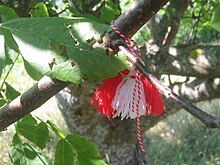Marteniza
Martenitsa ( f. , Bulgar . Мартеница, from the Bulgarian name for the month of March: март) is a small red and white jewelry that is worn in March every year according to an old custom . This Bulgarian custom dates back to before the 7th century AD. As one of the most popular Bulgarian customs and cultivated for centuries, mutual gifting with martenizi (мартеници, plural form) is on March 1st and the following week. They are small red and white pendants, tassels, dolls or simple bracelets made of fabric, wool or cotton threads that are worn by everyone in Bulgaria at the beginning of March. They will also be sent to the whole circle of friends by letter or postcard.
The Marteniza is essentially a talisman for health and a long life, which the colors symbolize: red for red cheeks and white for white hair and old age. They are worn on the left side (where the heart is) or as a bracelet on the left arm. You wear the red and white lucky charm until you see the first sign of spring - a stork , a swallow or a blossoming tree. Then (by April 1st at the latest) you hang them on a tree or put them under a stone and make a wish for something beautiful.
There is a similar tradition on March 1st in Romania and the Republic of Moldova . There she is called Mărțișor .
Baba Marta
Baba Marta (Баба Марта) is a popular, ornamental description for the month of March (German analogy: the spring or the figure of Frau Holle , who takes care of snow). "Baba" means grandma in German . The greeting Tschestita Baba Marta (Bulgar. Честита баба Марта, "Happy Grandma Marta") is typical for the beginning of March in Bulgaria.
Behind the Marteniza custom there is also the old belief that the red and white Martenizi Baba Marta, the personification of the month of March in the form of an old, angry and moody woman, are mild so that she does not get angry and send coldness over the country. This has to do with the country's climate: spring often heralds itself at the beginning of March, and snowfall nevertheless occurs towards the end of the month. All adults, children and pets are given Martenizi as gifts and adorned to keep them healthy.
Idioms
As a rather ironic reference to this custom, the phrase arose:
- A swallow doesn't make spring.
history
The origin of the Martenizi goes back to the establishment of the First Bulgarian Empire in 678 by the Proto- Bulgarians .
Legend has it that at the time the first Bulgarian state was founded, Kubrat's five sons, accompanied by their sister Houba, went hunting. When they reached the Danube , they saw a silver stag. They stood there petrified and did not dare to shoot the deer. The deer crossed the river and got to the other bank and showed the hunting party that there was a ford there, that is, a way to cross the river. A carrier pigeon brought bad news to the hunting party. Her father, the founder of the Old Bulgarian Empire, was on his death bed. In his last hours the father urged his sons Bajan , Kotrag , Asparuch , Kuber and Alzek not to let the loose ties between the different Bulgarian tribes break. His sons swore to defend Bulgaria.
Soon after the death of their father, the Khazars invaded their country. Ashiba - the Khan of the Khazars - Phanagoria managed to conquer the capital of the country.
Houba, Kubrat's daughter, was captured by Ashiba. Hoping to give her brothers a chance at freedom, she attempted suicide, but was stopped by the guards.
Her brothers kept their vows in various ways. Bayan stayed with his sister and recognized the rule of Khan Ashiba. Kotrag went north to the Volga , while Asparuch, Kuber and Alzek turned south in search of new land without an oppressor.
Before the brothers left secretly, they had agreed with their sister Houba and their brother Bajan, who would stay with them, to send a golden ribbon - tied around the foot of a bird - as a message when they would find free land. One day a hawk sent by Asparuch flew into Houba's room with the agreed signal, whereupon she and Bajan immediately made plans to escape. Just as they were looking for a place to cross the Danube, they were spotted and pursued by the Khazar scouts . Houba quickly tied a white ribbon around the falcon's foot and gave it to her brother Bajan. Then she hurried off to try to find a ford across the Danube. Bayan wanted to let the falcon soar, but just as the bird was about to take off, an enemy arrow hit Bayan and its blood soaked one end of the ribbon red.
With all their strengths, Houba and Bajan managed to reach the land that Asparuch had discovered - today's Bulgaria. Asparuch was able to welcome his dying brother and sister. Later he marked his soldiers with the white-red colored fibers of the ribbon.
literature
- Despina Leonhard: The March: Custom and Legend / Mărțişorul: Obicei şi Legendă . Ganderkesee 2016. ISBN 978-3-944665-06-1
- Avrora Moussorlieva: Martenitsa. The Sacred Thread that Connects the Bulgarians with the People of the Middle East and the Indian Subcontinent . (Master's thesis) University of Minnesota, 2011


